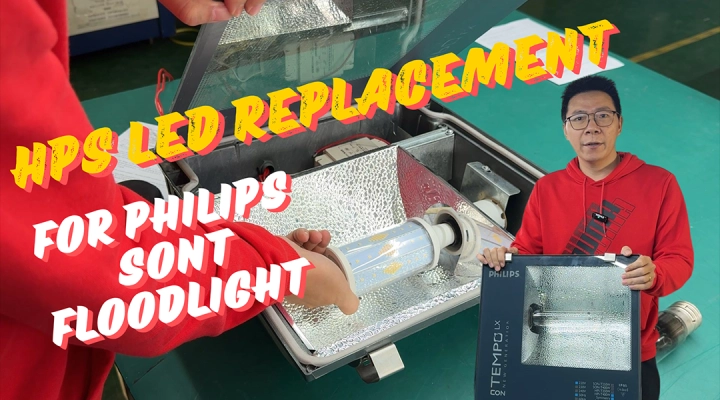Today, I’d like to share an inspiring case study of how our WYX series LED HID bulb successfully replaced a traditional floodlight HPS bulb. This project showcases the transformative potential of upgrading to LED lighting while maintaining the integrity of existing fixtu0res.
For decades, traditional floodlights with HPS bulbs have illuminated streets, squares, and industrial areas. While effective, these lights come with challenges, especially in terms of energy consumption and maintenance. Let’s explore how we addressed these issues step by step.
The Floodlight: A Durable Yet Outdated Classic
The floodlight we worked on is a classic design that has been widely used for over 30 years. It’s not uncommon to find this type of floodlight in:
- Public lighting for streets and parks.
- Floodlighting for sports fields and architectural features.
- Road lighting for highways and main roads.
- Square lighting for public plazas and gathering spaces.
Why Are Traditional Floodlights So Popular?
- Elegant Aesthetics: Their streamlined designs blend seamlessly into urban landscapes.
- Exceptional Durability: The housings of these lights are built to last for 20 years or more, withstanding harsh environmental conditions.
- Reliable Illumination: With a 250W SON-T HPS bulb, these floodlights provide adequate brightness for large areas.
However, as durable as the housings are, the HPS bulbs present ongoing challenges.
The Challenges of Using HPS Bulbs
The client’s floodlight was equipped with a 250W SON-T HPS bulb. While the light provided sufficient illumination, it came with several drawbacks:
- Short LifespanHPS bulbs typically last only 12,000 to 15,000 hours, which means frequent replacements. This is especially problematic when the floodlights are installed on tall poles or in hard-to-reach locations.
- High Maintenance CostsFrequent bulb replacements require skilled labor and equipment, significantly increasing maintenance expenses. For public lighting projects, these costs add up quickly.
- High Energy ConsumptionA 250W HPS bulb consumes a significant amount of energy, leading to high electricity bills for large-scale installations.
- Heat GenerationHPS bulbs produce excessive heat, which reduces energy efficiency and can contribute to wear and tear on the fixture itself.
For this client, keeping the durable and aesthetically pleasing housing was important. They wanted a solution that would maintain the same brightness while significantly reducing energy consumption and maintenance requirements.
Our Solution: WYX Series LED HID Bulb
To address the client’s concerns, we recommended our WYX series LED HID bulb, which is specifically designed for retrofitting traditional fixtures like floodlights. This HPS bulb replacement offers superior performance, lower energy consumption, and a much longer lifespan.
Key Features of the WYX Series LED HID Bulb
- Wide Compatibility: Available with E27/E40 sockets, making it easy to install in existing fixtures.
- Integrated LED Driver: Eliminates the need for external ballasts, simplifying installation.
- Surge Protection: Equipped with 6kV surge protection to ensure reliability in areas prone to power fluctuations.
- Energy Efficiency: Replaces a 250W HPS bulb with just 80W of power, reducing energy consumption by up to 60%.
- Long Lifespan: Lasts over 50,000 hours, dramatically lowering maintenance costs.
How We Replaced the HPS Bulb: 3 Simple Steps
Our HPS bulb retrofit process is straightforward and can be completed in just three steps:
Step 1: Match the Replacement Bulb
From our replacement chart, we determined that the 80W WYX LED HID bulb is an ideal substitute for the client’s 250W SON-T HPS bulb. The bulb dimensions and socket type (E27/E40) matched perfectly, ensuring compatibility with the existing floodlight housing.
Step 2: Remove the Ballast
Traditional HPS floodlights use an external ballast to regulate the electrical current. Since our LED HID bulbs feature an integrated driver, the ballast is no longer needed. Removing the ballast simplifies the wiring and optimizes the LED bulb’s performance.
Step 3: Install the LED Bulb
Finally, we installed the 80W WYX LED HID bulb directly into the floodlight using the existing socket. The process was quick and easy, allowing the client to retain the original housing while upgrading to LED lighting.
The Benefits of Switching from HPS to LED
Once the WYX LED bulb was installed, the client immediately noticed significant improvements:
- Enhanced BrightnessThe LED bulb provided the same or better brightness compared to the original 250W HPS bulb.
- Energy SavingsBy reducing power consumption from 250W to 80W, the client saved approximately 60% on electricity bills.
- Lower Maintenance CostsWith a lifespan of over 50,000 hours, the LED bulb requires far fewer replacements, cutting maintenance expenses by 200%.
- Reduced Heat EmissionThe LED bulb operates at a much lower temperature than the HPS bulb, improving overall efficiency and reducing wear on the fixture.
Applications of WYX LED HID Bulbs
Our WYX series bulbs are versatile and suitable for a wide range of applications, including:
- Street Lighting: Ideal for replacing high-pressure sodium streetlights in urban and suburban areas.
- Parking Lots: Improves safety and visibility while reducing energy costs.
- Floodlighting: Perfect for illuminating sports fields, public squares, and large outdoor areas.
- Industrial Sites: Enhances lighting quality in warehouses, factories, and refineries.
Why Choose LED for HPS Bulb Replacement?
Upgrading from HPS to LED offers numerous advantages:
- rgy EfficiencyLEDs use significantly less power to produce the same amount of light, making them a cost-effective choice for large-scale lighting projects.
- Environmental BenefitsUnlike HPS bulbs, LEDs are free of hazardous materials like mercury, making them safer for the environment.
- Instant IlluminationLEDs provide instant brightness without the warm-up time required by HPS bulbs.
- DurabilityWith a robust design and long lifespan, LEDs are ideal for outdoor and industrial applications.





